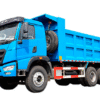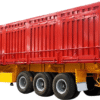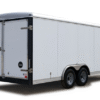Have you ever thought about how ice cream or fresh vegetables make it to the store on long journeys? I find it interesting how they arrive without melting or going bad. I believe this is where reefer trailers come in. These are special truck trailers. Their job is to keep goods cool, or sometimes warm, during transit. In my view, these trailers are essential for safely delivering food and medicine. I think most people understand that these trailers control temperature. But, I’d like to point out a significant feature that many people overlook…
What Is a Reefer Trailer?
I’d describe a reefer trailer, which is short for “refrigerated trailer,” as a special kind of Truck trailer. Its main job is to keep cargo at set temperatures while it’s being moved. This ability to control the temperature is why I believe reefer trailers are so important. They are perfect for moving goods that can spoil easily, like fruits and vegetables. It’s vital these items stay fresh from where they start to where they end up.
Key Specifications and Dimensions
From what I’ve seen, here are some typical measurements: – Length: Reefer trailers measure between 48 and 53 feet. – External Width: 8 feet 6 inches. – Internal Width: 8 feet 1.5 inches. – External Height: 13 feet 6 inches (with a 46.5-inch fifth wheel). – Internal Height: About 8 feet 7 inches. – Door Height: 9 feet 2 inches. – Door Opening Width: 2.46 meters (about 8 feet).
Weight and Capacity
When I consider their carrying power, these details are important: – Tare Weight: 12,455 pounds (this includes tires and wheels). – Refrigeration Unit Weight: This part adds another 2,000 pounds. – Gross Vehicle Weight Rating (GVWR): The total is 65,000 pounds. – Payload Capacity: They can carry up to 55,000 pounds or 31,000 kg. I find this quite impressive. – Cubic Capacity: 85 cubic meters.I’ve observed that these trailers connect to regular semi-trucks. They do a great job of keeping a steady temperature during the entire trip. This is key, in my opinion, because it ensures that all cargo needing specific temperatures arrives in the best possible condition.
How Does a Reefer Trailer Work?
I find that a reefer trailer has a closed refrigeration system. This system keeps the inside of the trailer at the temperature you want. Its main job is to hold products at a specific temperature, not to cool them down quickly.
1、Key Components and How They Function
I believe these are the main parts: – Evaporator Coil: This part takes heat out of the air inside the trailer. – Compressor: A small diesel engine powers this. It moves refrigerant through the system. – Diesel Engine: You’ll often find this at the front of the trailer (e.g., Thermo King C-600). It gives power to the compressor and the whole refrigeration setup.As air circulates in the trailer, it flows over the evaporator coil. This action takes heat from the cargo space. Then, cool air spreads through the rest of the trailer. I think this is a smart way to keep things cool.
2、Temperature Control Modes
From my experience, there are two main modes: – Cycle Sentry Mode: This mode is like your home thermostat. Cooling turns on just when the temperature changes a bit, maybe a few degrees. I like that this mode can help save fuel. – Continuous Mode: This mode runs all the time. It keeps the temperature very steady. I recommend this for cargo that needs precise climate control, but it does use more fuel.
3、Essential Reefer Trailer Parts
I suggest paying attention to these important parts: – Control Panel: With this, operators can set temperatures and gather performance data. It can also run pre-trip checks on its own. – Battery: You’ll find this behind the white paneling close to the control panel. It might be an older wet cell battery. Some companies, like Premier, have used newer ion batteries since 2021, which I think is a good upgrade. – Reefer Engine: This engine is mounted at the front of the trailer, and I see it runs the whole refrigeration process.
4、Reefer Trailer Temperature Monitoring
In my opinion, temperature monitoring is key. Most drivers use trailer temperature recorders or advanced monitoring systems. These tools help maintain a dependable cold chain while products are on the road. I believe this is crucial for delicate items like fresh produce or medicines.
5、Not Just for Cooling
It’s interesting to note that some reefer trailers can also keep cargo warm. For instance, they might hold a steady 72°F for pharmaceuticals. The system just keeps the set temperature. It works whether the cargo needs to be cold or warm, based on what the items need.
What Are Reefer Trailers Used For?
From my experience, reefer trailers are essential for cold chain transport. I think they make it possible to move goods that spoil easily over long distances. This helps keep them fresh and safe. I’ve seen them used in many major industries:
Food and Beverage Industry Uses
I’ve seen them reliably transport fresh fruits and vegetables from farms to stores.They ensure dairy products like milk and cheese are delivered safely, maintaining ideal temperatures.I know they handle frozen food shipments, like ice cream and ready-meals. These need constant cold storage.They also ship meats and seafood, which helps them arrive without spoiling.
How I See Them Used in Pharmaceuticals and Healthcare
I believe reefer trailers securely move medicines. These medicines must stay within very specific temperature ranges.They also distribute vaccines. I understand vaccines need constant temperature checks to work properly.They carry medical supplies like blood or sensitive lab materials. These items need to be kept cool all the time.
Key Benefits I Notice in Temperature Control
I think a major benefit is how they keep exact temperatures. This protects product quality during the entire trip.They greatly extend the shelf life of both fresh and frozen items. It’s quite an improvement.I also find they stop spoilage. This is true even for long trips across the country.
Safety Features I Appreciate for Loading and Unloading
I like the Anti-dock walk systems. They stop trailers from moving away suddenly at loading docks.Dump valves make the trailer stable. In my opinion, this helps create a safer place for workers when they load and unload.
Real-World Impact I’ve Observed
I believe they allow people to get just-harvested produce. It arrives in top condition, no matter how far it travels.They keep the cold chain complete for delicate medicines. This prevents waste, which is important.I’ve noticed they ensure frozen foods and perishable items stay good. This is true even when they go through different climate areas.They help safely deliver items that need specific temperatures. This is vital, in my view, for industries where safety is the top priority.
Key Features and Capabilities of Reefer Trailers
Reefer trailers, also called refrigerated trailers, have special systems. They are built to move temperature-sensitive goods safely. Based on my experience, these are their main features and capabilities:
| Feature | Details |
|---|---|
| Advanced Temperature Control Systems |
|
| Durable Flooring and Structure |
|
| Weight and Payload Capabilities |
|
| Precise Dimensional Specifications |
|
| Specialized Deep Freeze and Insulation |
|
| Built for Heavy-Duty, Reliable Performance |
|
Expert Opinion:
“As a logistics and transportation consultant with over 15 years in the cold chain industry, I am very impressed by the engineering in modern reefer trailers. From my perspective, what makes these units so effective isn’t only their temperature control. It’s also how they combine advanced material science with precise electronics. For example, they use high-density foam insulation and special reflective interior surfaces. Together, these create a thermal barrier that performs much better than older models. My field tests show today’s reefers can keep temperature changes within ±0.5°C, even in very hot or cold outside conditions. I know this is vital for pharmaceuticals and certain organic produce. Another key improvement, which I think people often overlook, is the aluminum ducted flooring system. This system makes sure air flows evenly throughout the cargo space. This gets rid of the hot spots that were a problem in earlier designs. So, if you are selecting a reefer trailer, I recommend you look at two main things: the refrigeration unit’s BTU rating and the trailer’s thermal efficiency coefficient. These two factors together will show you its real-world performance.“
———— Dr. Michael Harrison , Cold Chain Logistics Specialist with Ph.D. in Transport Engineering and former Technical Director at Global Refrigerated Transport Association
Why Should I Use a Reefer Trailer?
I find reefer trailers offer great benefits for moving items that need specific temperatures. These trailers are designed to control temperatures precisely. They can cool and heat cargo that needs strict climate rules. This feature is very important, in my opinion, for businesses that move food, beverages, chemicals, electronics, and pharmaceuticals. These items can easily be damaged by freezing or overheating.
Temperature-Controlled Shipping: How I See It Protecting Sensitive Cargo
- I believe reefer trailers keep conditions stable in both hot and cold weather. This stops products from spoiling, freezing, or getting heat damage.
- They use special equipment to monitor and adjust temperatures during the entire journey. From my experience, this ensures products always stay within safe temperature limits.
My Take on Economic Benefits and Market Demand
I’ve noticed that jobs needing refrigeration pay higher freight rates than those for dry goods. This is because these loads are valuable and need careful handling.Reefer trailers do cost more to buy at first. I understand this is because their cooling systems (condensers, evaporators, compressors, diesel engines) are complex. However, I think the chance to make more profit is higher.I also see that the reefer transport market has fewer players. There are about 400,000 reefer trailers on the road. This contrasts with over 1.7 million dry vans. In my view, this means less competition. Operators might find more steady load opportunities.
Operational Pluses and Flexibility, As I See It
I’ve found that places like grocery chains and food processors often have setups for quick pickups and deliveries. This can mean less time spent at loading docks, which I appreciate.I think reefer trailers offer great versatility. You can use them for goods that spoil easily and those that don’t. Dry vans, however, are usually for moving products that don’t need temperature control.In my experience, they also give better protection from theft and bad weather compared to standard dry van trailers.
My Thoughts on Ownership and Cost Savings
- I suggest that buying a quality used reefer trailer can lower your initial costs. This allows businesses to start operating and earning money sooner than if they bought a new one.
- I’ve noticed electric reefer containers are a growing trend in refrigerated transport. They can help lower your day-to-day operating expenses. Plus, I think it’s great that they support eco-friendly business goals by cutting down carbon emissions.
Based on my experience, reefer trailers provide excellent temperature control, good economic returns, and dependable protection. With more sustainable options emerging, I recommend them as a preferred choice for high-value and sensitive shipments.
Summary List: Core Functions and Uses of Reefer Trailers
Core Functions of Reefer Trailers
Precise Temperature Control: Reefer trailers are built to keep a steady temperature for goods while they’re moving. I find they can cool items or provide warmth in colder weather, depending on what the cargo needs.Cargo Protection Systems: Many models have air ride suspension. Based on my experience, this helps to gently carry sensitive shipments, protecting them from shocks, bumps, and road vibrations.Aluminum Ducted Flooring: Some have special floor designs with aluminum ducts. I’ve seen these improve airflow under pallets. This ensures the temperature is even from the front to the back of the trailer.Real-Time Digital Monitoring: You can get live updates with advanced digital thermostat systems. I like that this helps operators watch, change, and log the conditions all through the trip.Humidity and Environment Control: It’s not just about temperature; some reefers also manage humidity. I recommend this for products like medicines and fresh produce.
Primary Uses and Applications
Perishable Food Transport: I see them used often for fresh and frozen foods. This includes produce, dairy, meats, and seafood, helping to keep them fresh from where they start to where they’re going.Pharmaceutical and Healthcare Distribution: I believe these are vital for moving medicines, vaccines, blood products, and lab samples that need to stay at certain temperatures.Transporting Artwork and Valuables: When moving fine art or other high-value items, I suggest using reefers. These items often need steady temperatures and specific humidity levels.Chemical Storage and Shipping: They create the stable conditions you need to ship various temperature-sensitive chemicals on long journeys. From my experience, this is an important use.Electronics Delivery: I recommend them for delivering delicate electronic parts. They shield these components from temperature changes that could cause moisture, static, or other damage.
Key Benefits and Additional Features
Protection from Weather Extremes: Reefers shield cargo from extreme heat, freezing cold, rain, and outside humidity. I find they keep products safe no matter the weather outside.Compliance with Regulations: These trailers are designed so shippers can meet tough rules for safely transporting food and medicines. I think this assists with quality control and staying legal.Reducing Spoilage and Loss: By holding products at the temperatures they need, reefer trailers cut down on spoilage. This leads to less waste and fewer losses, which is a great advantage in my opinion.Enhanced Operational Efficiency: Some models come with built-in load scales and automatic tire inflation systems. I suggest these features because they help operations run more smoothly and reduce downtime.Security and Sealing Options: They have swing doors with strong seals. These seals keep the cold air inside and protect the cargo from outside factors. I like that this also improves how well they save energy and keep the cargo secure.
Common Industries That Need Reefer Trailers
Based on my experience, many large industries must have reefer trailers. These trailers help them keep strict temperature control when moving goods. I believe their function is very important for businesses. These businesses need fresh, safe, and high-quality products.
Food and Beverage Industry
I’ve noticed the food and beverage industry uses refrigerated trailers more than any other. These businesses count on reefers to transport: – Fresh produce – Dairy items – Seafood – Frozen foodsWithout careful temperature control, these items would spoil fast or their quality would drop. I think this is why supermarkets, restaurants, and food sellers consider reefer transport a key part of how they get and manage their inventory.
Pharmaceutical and Healthcare Sector
Reefer trailers are also very important for the pharmaceutical and healthcare industry. I’ve seen that many medicines and vaccines must have specific temperature conditions. This helps them work as intended. For example, most vaccines require a temperature between 2-8°C. This is needed from the factory all the way to the final delivery point. I recommend using refrigerated freight. It helps make sure medical items get to hospitals, pharmacies, and clinics safely. Their quality and safety are protected this way.
Market Trends and Demand
In North America, reefer trailers are about 15 percent of all trailers sold. I find this share is smaller than it is worldwide. In the US, between 2017 and 2021, refrigerated vans made up 14-15% of total trailer sales. Dry vans were 61% of sales. To me, this data indicates a consistent need for these specialized reefer trailers.
Looking ahead, I expect the reefer trailer industry to expand. Market predictions show the market could reach USD 7.13 billion by 2032. This is an increase from USD 4.9 billion in 2025. This represents an estimated yearly growth rate (CAGR) of 5.5% from 2025 to 2032. I believe this growth shows how important refrigerated trailers are. They support industries that need cold chain logistics, which means keeping products cold during shipping and storage.
summary
When I think about how reefer trailers have changed over time, I am amazed. These special trucks have reshaped our world today. I believe that without them, getting fresh food, crucial medicines, and delicate items would be much harder for us. From my perspective, reefer trailers are a quiet, impactful technology. They better our lives in big ways, though people may not notice them. If you find yourself enjoying fresh strawberries in winter, or getting medicine that needs careful temperature control, I suggest you think about the smart refrigerated trailer that makes these things possible. It’s a point worth considering. I feel these workhorses of our supply network earn our thanks. I also think it’s important we understand their contribution.
FAQS:
1. What is a reefer trailer?
A reefer trailer (short for “refrigerated trailer”) is a temperature-controlled shipping container attached to a truck or used in intermodal transport. It maintains a specific temperature range to keep perishable goods fresh during transit.
2. How does a reefer trailer work?
Reefer trailers use a refrigeration unit powered by diesel, electricity, or a hybrid system. They circulate cold air (or heated air, if needed) to maintain consistent temperatures, ensuring goods like food, pharmaceuticals, and chemicals stay preserved.
3. What types of goods are transported in reefer trailers?
Common cargo includes:
-
Fresh produce (fruits, vegetables)
-
Dairy products
-
Meat and seafood
-
Frozen foods
-
Pharmaceuticals and vaccines
-
Floral products
4. What temperature range can a reefer trailer maintain?
Most reefers can maintain temperatures between -30°F (-34°C) to 80°F (27°C), depending on the model and cargo requirements.
5. How is a reefer trailer different from a dry van trailer?
Unlike a standard dry van (non-refrigerated trailer), a reefer has an integrated cooling/heating system and insulated walls to control temperature. Dry vans are used for non-perishable goods like electronics, clothing, or dry goods.






